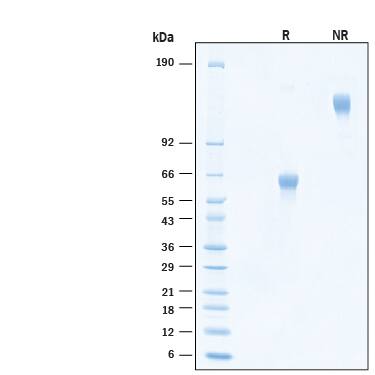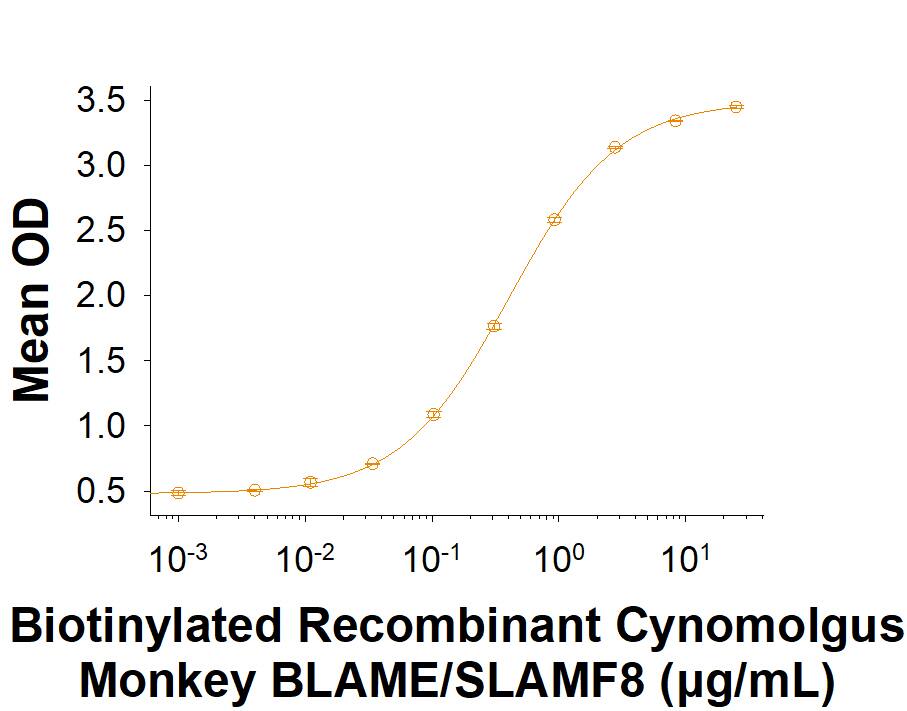Recombinant Cynomolgus BLAME/SLAMF8 Fc Chimera Protein, CF
R&D Systems, part of Bio-Techne | Catalog # 11100-BL

Key Product Details
Source
CHO
Accession #
Structure / Form
Disulfide-linked homodimer
Conjugate
Unconjugated
Applications
Bioactivity
Product Specifications
Source
Chinese Hamster Ovary cell line, CHO-derived cynomolgus monkey BLAME/SLAMF8 protein
| Cynomolgus Monkey BLAME/SLAMF8 (Ala23-Asp233) Accession # XP_005541356.1 |
IEGRMD | Human IgG1 (Pro100-Lys330) |
| N-terminus | C-terminus |
Purity
>95%, by SDS-PAGE visualized with Silver Staining and quantitative densitometry by Coomassie® Blue Staining.
Endotoxin Level
<0.10 EU per 1 μg of the protein by the LAL method.
N-terminal Sequence Analysis
Ala23
Predicted Molecular Mass
50 kDa
SDS-PAGE
55-70 kDa, under reducing conditions.
Activity
Measured by its binding ability in a functional ELISA.
When Recombinant Cynomolgus Monkey BLAME/SLAMF8 Fc Chimera (Catalog #11100-BL) is immobilized at 1.0 µg/mL (100 µL/well), the concentration of Recombinant Cynomolgus Monkey BLAME/SLAMF8 Fc Chimera Biotinylated Protein that produces 50% of the optimal binding response is 0.200-2.00 μg/mL.
When Recombinant Cynomolgus Monkey BLAME/SLAMF8 Fc Chimera (Catalog #11100-BL) is immobilized at 1.0 µg/mL (100 µL/well), the concentration of Recombinant Cynomolgus Monkey BLAME/SLAMF8 Fc Chimera Biotinylated Protein that produces 50% of the optimal binding response is 0.200-2.00 μg/mL.
Scientific Data Images for Recombinant Cynomolgus BLAME/SLAMF8 Fc Chimera Protein, CF
Recombinant Cynomolgus Monkey BLAME/SLAMF8 Fc Chimera Protein Binding Activity.
When Recombinant Cynomolgus Monkey BLAME/SLAMF8 Fc Chimera Protein (Catalog # 11100-BL) is immobilized at 1.0 µg/mL (100 µL/well), the concentration of Recombinant Cynomolgus Monkey BLAME/SLAMF8 Fc Chimera Biotinylated Protein that produces 50% of the optimal binding response is 0.200-2.00 μg/mL.Recombinant Cynomolgus Monkey BLAME/SLAMF8 Fc Chimera Protein SDS-PAGE.
2 μg/lane of Recombinant Cynomolgus Monkey BLAME/SLAMF8 Fc Chimera Protein (Catalog # 11100-BL) was resolved with SDS-PAGE under reducing (R) and non-reducing (NR) conditions and visualized by Coomassie® Blue staining, showing bands at 55-70 kDa and 110-140 kDa, respectively.Formulation, Preparation and Storage
11100-BL
| Formulation | Lyophilized from a 0.2 μm filtered solution in PBS with Trehalose. |
| Reconstitution | Reconstitute at 200 μg/mL in PBS. |
| Shipping | The product is shipped at ambient temperature. Upon receipt, store it immediately at the temperature recommended below. |
| Stability & Storage | Use a manual defrost freezer and avoid repeated freeze-thaw cycles.
|
Background: BLAME/SLAMF8
References
- Shachar, I. et al. (2019) Clin. Immunol. 204:23.
- Dragovich, M.A. and Mor, A. (2018) Autoimmunity reviews, 17:674.
- Wang, G. et al. (2015) PloS one, 10:e0121968.
- Sugimoto, A. et al. (2018) Exp. Dermatol. 27:641.
- Wang, G. et al. (2012) J. Immunol. 188:5829.
- Orentas, R.J. et al. (2012) Front Oncol. 2:194.
- Sugimoto, A. et al. (2020) Sci. Rep. 10:2505.
- Zhang, Q. et al. (2019) J. Clin. Oncol. 37:e14078.
- Zhang Q. et al. (2021) Clin. Transl. Immunology. 10:1347.
Long Name
SLAM Family Member 8
Alternate Names
CD353, SBBI42, SLAMF8
Gene Symbol
SLAMF8
UniProt
Additional BLAME/SLAMF8 Products
Product Documents for Recombinant Cynomolgus BLAME/SLAMF8 Fc Chimera Protein, CF
Product Specific Notices for Recombinant Cynomolgus BLAME/SLAMF8 Fc Chimera Protein, CF
For research use only
